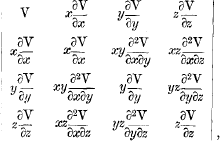No CrossRef data available.
Published online by Cambridge University Press: 15 September 2014
1. In two memoirs on the “Theory of Probabilities,” Boole was led to the consideration of a peculiarly interesting form of determinant which has only positive terms in its final form of development, and which in the case of the fourth order may be written

V standing therein for

In the first of the two memoirs the determinant is not explicitly referred to, but in the second it receives considerable attention, Boole, indeed, there saying that the memoir “involves discussions relating to the properties of a certain functional determinant, and to the possible solutions of a system of algebraical equations of peculiar form, discussions which will, I trust, be thought to possess a value as contributions to mathematical analysis, independent of their present application.”
page 448 note * Boole, G., “On the Application of the Theory of Probabilities to the Question of the Combination of Testimonies or Judgments,” Trans. Roy. Soc. Edin., xxi. (1857), pp. 597–652.CrossRefGoogle Scholar
Boole, G., “On the Theory of Probabilities,” Philos. Trans. Roy. Soc. Lond., clii. (1862), pp. 225–252.Google Scholar
page 448 note † Mure, T., “A New Unisignant,” Messenger of Math., xl. pp. 177–192.Google Scholar